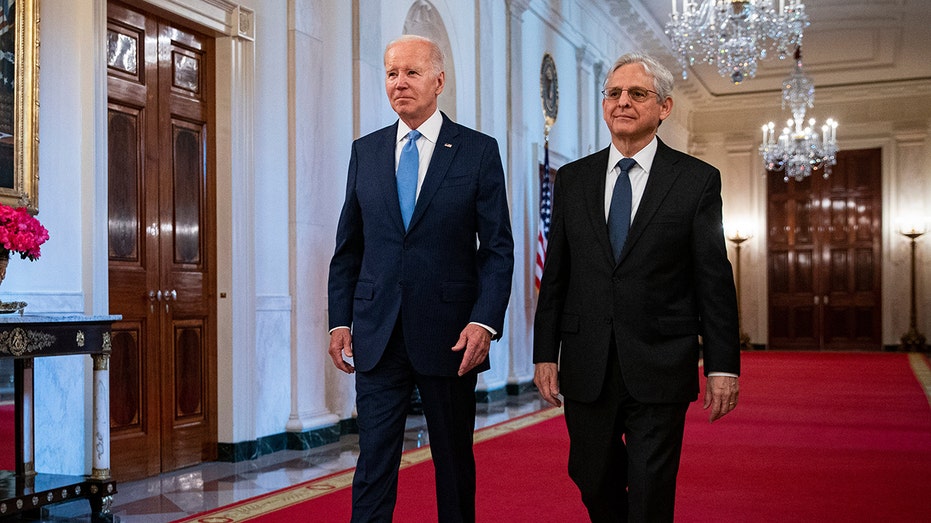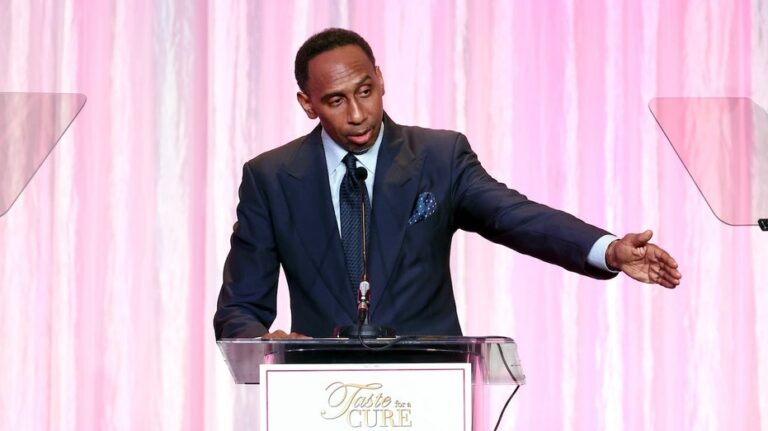
FIRST ON FOX: A Kentucky judge declined to immediately sign a police reform consent decree forged by the Justice Department and city of Louisville during a hearing one courtroom participant described as a hasty attempt by the Biden administration to hamstring President-elect Donald Trump.
The Monday hearing was one of at least three instances of ongoing litigation in which the Biden administration is seeking to enshrine progressive policing policies in their 11th hour in a difficult-to-reverse manner.
Federal Judge Benjamin Beaton refused to be a “rubber stamp” for a 240-page reform plan spurred by the 2020 police-involved shooting of Breonna Taylor, Oversight Project counsel Kyle Brosnan said in a Tuesday interview.
Taylor had been killed in a hail of police gunfire after Louisville officers sought to serve a drug warrant at her boyfriend Kenneth Walker’s house, when her beau fired a “warning shot” through the door and struck Officer Jonathan Mattingly in the leg.
Brosnan noted a consent decree is different from other legal agreements — in that they cannot simply be reversed by presidential order or a change of heart by one of the parties involved.
Brosnan characterized the Kentucky decree’s reforms as “woke,” while his colleague, Oversight Project executive director Mike Howell, previously called them a “laundry list of BLM-type standards” the left has long called for.
The Law Enforcement Legal Defense Fund joined the amicus brief filed, as Brosnan noted LELDF’s leader Jason Johnson has “first-hand experience” with consent decrees following the Freddie Gray riots and ensuing investigation.
The consent decree alleged a pattern or practice of racial bias in Louisville policing, including in traffic stops, sexual assault probes or use-of-force.
“And the judge went through each of those topics and said, ‘OK, what is your basis for this?’,” Brosnan recounted.
In court, DOJ attorney Paul Killebrew was asked for data on lethal force incidents to better understand patterns alleged in the consent decree.
Killebrew reportedly replied that the DOJ could not provide such information in order to “maintain leverage” in any future litigation.
That dynamic was a theme during the marathon hearing, according to Brosnan.
However, it was not the only opportunity for the DOJ and city to convince Beaton to sign their decree, as the judge gave until Friday for additional documents to be filed, but time is of the essence.
While Inauguration Day is not necessarily a deadline for the Biden DOJ to get the decree approved, it won’t be long after that they will likely run out of time, Brosnan said.
He compared the dynamic to how Trump — early in his first term — fired Obama-holdover acting DOJ chief Sally Yates for refusing to enforce his “Muslim ban.”
PROPOSED CHICAGO POLICE RESOURCE CUTS COULD LAND CITY IN COURT UNDER CONSENT DECREE, OFFICIALS WARN
Outgoing administration officials at various levels will remain in “acting” roles until the Senate confirms incoming nominees.
Therefore, the Biden DOJ effectively has until Pamela Bondi as attorney general or Harmeet Dhillon as head of the DOJ Civil Rights Division are in office to get their decree across the finish line, the attorney said.
Brosnan said there are at least two other police reform consent decrees matriculating through the legal process: in Maryland and Minnesota.
On Jan. 6, the DOJ reached an agreement with Minneapolis — that still requires court approval — to reform the department’s “unconstitutional and unlawful practices” allegedly counter to the Americans With Disabilities Act and 14th Amendment.
In October 2024, the feds sued the Maryland Department of State Police alleging Civil Rights Act violations.
CLICK HERE TO GET THE FOX NEWS APP
“The United States claims MDSP violated Title VII when it used a certain physical fitness test and a certain written test to hire entry-level Troopers because the tests disqualified more female and African-American applicants than others and were not job related,” a court document reads.
Maryland police dispute the allegations.
Monday’s petitioners noted how the last Trump administration began with then-Attorney General Jeff Sessions reexamining Obama-era consent decrees.
“You are well within your power as judge to sort of pump the brakes and wait and see what the new administration has to say here,” Brosnan characterized their testimony to Beaton.
“Trump has a right to sort of not be handcuffed by the Biden administration — he won by-and-large because of the crime problems of urban America.”
Fox News Digital reached out to the DOJ for comment.
FIRST ON FOX: A Kentucky judge declined to immediately sign a police reform consent decree forged by the Justice Department and city of Louisville during a hearing one courtroom participant described as a hasty attempt by the Biden administration to hamstring President-elect Donald Trump.
The Monday hearing was one of at least three instances of ongoing litigation in which the Biden administration is seeking to enshrine progressive policing policies in their 11th hour in a difficult-to-reverse manner.
Federal Judge Benjamin Beaton refused to be a “rubber stamp” for a 240-page reform plan spurred by the 2020 police-involved shooting of Breonna Taylor, Oversight Project counsel Kyle Brosnan said in a Tuesday interview.
Taylor had been killed in a hail of police gunfire after Louisville officers sought to serve a drug warrant at her boyfriend Kenneth Walker’s house, when her beau fired a “warning shot” through the door and struck Officer Jonathan Mattingly in the leg.
Brosnan noted a consent decree is different from other legal agreements — in that they cannot simply be reversed by presidential order or a change of heart by one of the parties involved.
Brosnan characterized the Kentucky decree’s reforms as “woke,” while his colleague, Oversight Project executive director Mike Howell, previously called them a “laundry list of BLM-type standards” the left has long called for.
The Law Enforcement Legal Defense Fund joined the amicus brief filed, as Brosnan noted LELDF’s leader Jason Johnson has “first-hand experience” with consent decrees following the Freddie Gray riots and ensuing investigation.
The consent decree alleged a pattern or practice of racial bias in Louisville policing, including in traffic stops, sexual assault probes or use-of-force.
“And the judge went through each of those topics and said, ‘OK, what is your basis for this?’,” Brosnan recounted.
In court, DOJ attorney Paul Killebrew was asked for data on lethal force incidents to better understand patterns alleged in the consent decree.
Killebrew reportedly replied that the DOJ could not provide such information in order to “maintain leverage” in any future litigation.
That dynamic was a theme during the marathon hearing, according to Brosnan.
However, it was not the only opportunity for the DOJ and city to convince Beaton to sign their decree, as the judge gave until Friday for additional documents to be filed, but time is of the essence.
While Inauguration Day is not necessarily a deadline for the Biden DOJ to get the decree approved, it won’t be long after that they will likely run out of time, Brosnan said.
He compared the dynamic to how Trump — early in his first term — fired Obama-holdover acting DOJ chief Sally Yates for refusing to enforce his “Muslim ban.”
PROPOSED CHICAGO POLICE RESOURCE CUTS COULD LAND CITY IN COURT UNDER CONSENT DECREE, OFFICIALS WARN
Outgoing administration officials at various levels will remain in “acting” roles until the Senate confirms incoming nominees.
Therefore, the Biden DOJ effectively has until Pamela Bondi as attorney general or Harmeet Dhillon as head of the DOJ Civil Rights Division are in office to get their decree across the finish line, the attorney said.
Brosnan said there are at least two other police reform consent decrees matriculating through the legal process: in Maryland and Minnesota.
On Jan. 6, the DOJ reached an agreement with Minneapolis — that still requires court approval — to reform the department’s “unconstitutional and unlawful practices” allegedly counter to the Americans With Disabilities Act and 14th Amendment.
In October 2024, the feds sued the Maryland Department of State Police alleging Civil Rights Act violations.
CLICK HERE TO GET THE FOX NEWS APP
“The United States claims MDSP violated Title VII when it used a certain physical fitness test and a certain written test to hire entry-level Troopers because the tests disqualified more female and African-American applicants than others and were not job related,” a court document reads.
Maryland police dispute the allegations.
Monday’s petitioners noted how the last Trump administration began with then-Attorney General Jeff Sessions reexamining Obama-era consent decrees.
“You are well within your power as judge to sort of pump the brakes and wait and see what the new administration has to say here,” Brosnan characterized their testimony to Beaton.
“Trump has a right to sort of not be handcuffed by the Biden administration — he won by-and-large because of the crime problems of urban America.”
Fox News Digital reached out to the DOJ for comment.






